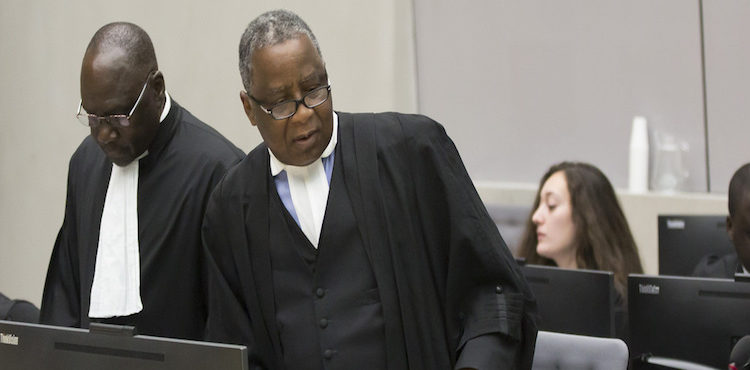By Tom Maliti, IJ Monitor
A prosecution witness in the trial of Dominic Ongwen, a former commander of the Lord’s Resistance Army (LRA) expressed his apprehension about the line of questioning Ongwen’s lawyer had been pursuing.
Witness P-003 said this at the start of the hearing of March 2, telling the court he had not been able to sleep the previous night.
“I was called at the ICC. I have the recordings of the LRA messages. But when I arrived I discovered that the issues regarding the ICC were set aside. Instead I was being accused,” Witness P-003 told the court on Thursday after being given permission to speak before answering any questions.
The accusation he is referring to are questions he was asked on Wednesday about whether he drew a gun on a senior intelligence officer in the compound where they worked in the northern Uganda town of Gulu.
“I fear once I go back home I may be arrested and taken to prison because in answering Ayena’s questions I revealed a lot of secrets of the Ugandan government,” the witness continued, referring to Krispus Ayena Odongo, Ongwen’s lead defense lawyer.
“If there are no more things I request that I be allowed to go back home because I have a family to take care of. I have orphans to take care of,” said the witness. He also asked to be allowed to ask Odongo questions, saying that in his culture when one is on trial one is asked questions and can also ask questions to others.
Presiding Judge Bertram Schmitt then asked the prosecution whether they had anything to say.
Senior trial lawyer Benjamin Gumpert answered they did, and he then read out Article 19(1)(c) of the Agreement on the Privileges and Immunities of the ICC. The article deals with the privileges and immunities of a witness testifying before the court. The section Gumpert read out is as follows:
Immunity from legal process of every kind in respect of words spoken or written and all acts performed by them in the course of their testimony, which immunity shall continue to be accorded even after their appearance and testimony before the Court.
After Gumpert read this section, the court went into private session. About 40 minutes later when the court hearing was opened to the public again, Odongo was starting to ask the witness a question.
Witness P-003 is a member of the Uganda People’s Defense Force who intercepted LRA radio communications since at least 2002. The written and audio records of Ugandan government intercepts of LRA communication form part of the evidence the prosecution is presenting to prove its case against Ongwen.
He is on trial on 70 counts of war crimes and crimes against humanity. The charges against Ongwen include his alleged role as a commander with the LRA between 2003 and 2004 during attacks on the Pajule, Odek, Abok, and Lukodi camps for people displaced by the conflict in northern Uganda. He also faces charges of forcibly marrying seven women, who were girls at the time, and committing sexual crimes against them.
On Thurday, Odongo asked Witness P-003 about how LRA commanders changed how they communicated over radio to evade interception and whether such changes were permanent. He also asked the witness who in the LRA decided to attack a particular place. Odongo also questioned the witness about two attacks on camps for displaced people in Odek and Abok.
Often Witness P-003 would preface his answers by saying, “There is nothing new here,” or “I want people to understand this clearly” or sarcasm as was the case when he was asked about information he may have gathered while intercepting LRA radio communications about attacks the group was planning.
“Now, Mr. Witness, you told court that the attack on Abim was foiled because of your interception. I want you to tell court whether you also intercepted the attack on Pajule, Odek, Abok, and Lukodi,” asked Odongo. Abim is a town in northern Uganda.
“Apparently the defense has no questions to ask. There are so many things which we recorded. There are also cases where Tabuley [an LRA commander] attacked Pajule. There were many other recordings where [LRA deputy leader Vincent] Otti killed people, where [an LRA commander Thomas] Kwoyelo killed people,” replied the witness.
When the court took its first break of the day, it did not resume after 30 minutes as is normally the case. The trial only resumed about one and a half hours later and Witness P-003 was no longer testifying in the courtroom as he had been doing since Monday. Instead he was testifying in what Judge Schmitt called “a special room” via video link. There was no explanation given for the change.
witness P-003 will continue testifying on Friday.







